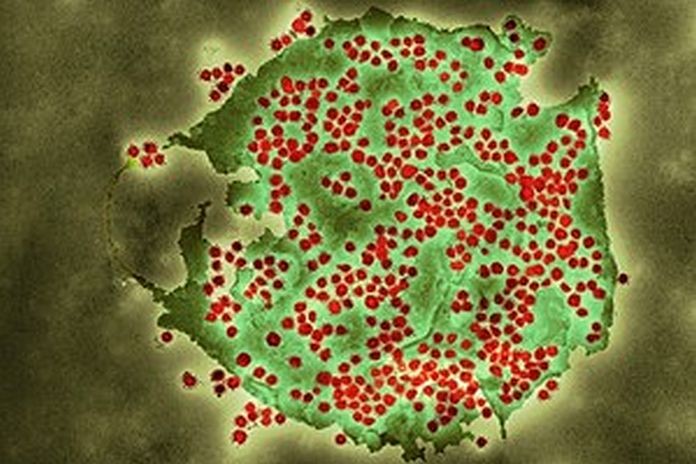LONDON, England – UKHSA’s most recent variant technical briefing includes examination of a number of recombinant variants which have been identified in the UK, as well as updated epidemiological and genomic analysis of Omicron BA.2.
A recombinant variant occurs when an individual becomes infected with 2 or more variants at the same time, resulting in a mixing of their genetic material within the patient’s body. This is not an unusual occurrence and several recombinant SARS-CoV-2 variants have been identified over the course of the pandemic.
As with any other coronavirus (COVID-19) variant, the vast majority do not confer any advantage to the virus and die out relatively quickly.
UKHSA’s new analysis examines three recombinants, known as XF, XE, and XD. Of these, XD and XF are recombinants of Delta and Omicron BA.1, while XE is a recombinant of Omicron BA.1 and BA.2.
In the UK, 38 cases of XF have been identified, though none have been seen since mid-February. There is currently no evidence of community transmission within the UK.
XD has not been identified in the UK to date, though 49 cases have been reported to global databases, the majority of these are in France.
A total 637 cases of XE – a recombinant of Omicron BA.1 and BA.2 – have been confirmed in the UK so far. The earliest of these has a specimen date of 19 January 2022. There is currently insufficient evidence to draw conclusions about growth advantage or other properties of this variant. We continue to monitor all recombinants closely, routinely through our world-leading genomic surveillance and sequencing capability.
Professor Susan Hopkins, Chief Medical Advisor, UKHSA, said:
“Recombinant variants are not an unusual occurrence, particularly when there are several variants in circulation, and several have been identified over the course of the pandemic to date. As with other kinds of variant, most will die off relatively quickly. This particular recombinant, XE, has shown a variable growth rate and we cannot yet confirm whether it has a true growth advantage. So far there is not enough evidence to draw conclusions about transmissibility, severity or vaccine effectiveness. UKHSA will continue to monitor the situation closely as a matter of routine, as we do all data relating to SARS-CoV-2 variants both in the UK and internationally.”
The variant technical briefing also includes updated analysis on Omicron BA.2, currently the dominant variant in the UK.
BA.2 is estimated to account for approximately 93.7 percent of cases in England, with the highest prevalence in the South East (96.4%) and the lowest in the East Midlands (91.1%). Data for Scotland, Wales and Northern Ireland is not included in the UKHSA Technical Briefing.
BA.2 continues to demonstrate a substantial growth advantage. Since the middle of February, this growth rate has settled at approximately 75 percent higher than other circulating Omicron lineages in England.
Ongoing analysis by UKHSA has found no evidence that infection with Omicron BA.2 results in a greater risk of hospitalisation, compared to Omicron BA.1.
UKHSA has also this week published further vaccine effectiveness data against hospitalisation following a booster dose. For the first time, this data includes analysis on vaccine effectiveness 15+ weeks after the booster dose.
This data shows that protection against severe illness from COVID-19 remains at over 90 percent in those aged 65 and over up to 14 weeks after a booster dose. While there is a suggestion that this wanes slightly after 15 weeks, protection in this age group remains high at over 85 percent.
This paper can be found as a pre-print, and the data is referred to in the latest vaccine surveillance report.
Change to variant classifications
UKHSA is updating its variant classification system to give a clearer indication of which variants have significant changes compared to the current dominant variant.
Under the new system, the variant of concern (VOC) label will be assigned to variants which are currently emerging or circulating, and which the following characteristics can be confirmed or predicted:
- A detrimental change in biological properties (changes in transmissibility, severity or immune evasion) compared to the current dominant variant.
- A growth rate potentially compatible with the eventual replacement of the current dominant variant.
There will be no other categorisation of variants, including no variant under investigation (VUI) category. Previous variants of concern which no longer meet the criteria will be redesignated.
UKHSA will continue to designate new variants, and these will receive a variant number (in the format V-date-number). We will continue to closely analyse all available biological, epidemiological and genomic evidence for any SARS-CoV-2 variant in the UK or internationally.
These changes will take effect as of 1 April 2022 and will be reflected in full in future technical briefings.
Source: UK Health Security Agency
Published: 1 October 2021
Last updated: 25 March 2022 — See all updates






